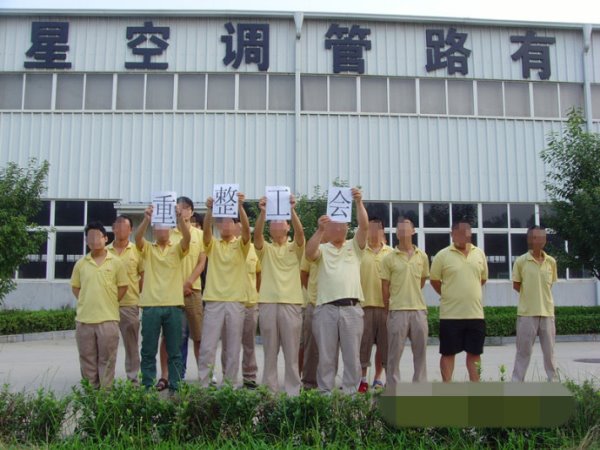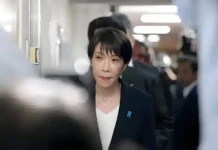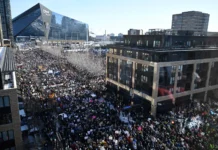We welcome an open and honest discussion with the readers and editors of redchinaCn.net on these developments and the programme and demands needed to take workers’ struggles forward
By chinaworker.info
Redchina website re-published our article from chinaworker.info about the three-week Flex workers’ strike in Zhuhai (China: Zhuhai Flex workers’ strike sabotaged by official trade union). Our article was originally published on 28 April, and re-published by redchina on 21 May.
The regional officialdom of the ACFTU (All-China Federation of Trade Unions) ordered the workers to end the strike in the name of “stability” without any of the strikers’ demands being met by the company. Workers understandably were enraged by this betrayal.
Strangely, redchina carried an editorial comment on our article criticising our call for independent unions as “totally wrong”. In doing so, your editorial comment gives an inaccurate picture of our position on the trade union question, which is a crucial question for Chinese workers.
China in 2018 has entered a new phase of workers’ struggle, on a higher level, with cross-regional and coordinated strikes becoming more common. This shows an increase of workers’ consciousness and organisational abilities. This was the case with the crane operators who staged strikes and protests in more than 30 cities in April and May, Lalamove drivers, and more recently interior design company workers. China’s long suffering school teachers have also staged strikes and protests in many localities recently, partly inspired by the very successful strikes by school teachers in the US.
We welcome an open and honest discussion with the readers and editors of redchina on these developments and the programme and demands needed to take workers’ struggles forward. Differences can be debated in a friendly way, without misreporting our adversary’s standpoint.
What are independent unions?
Redchina makes a major error in our opinion when it equates our slogan for independent unions with pro-bourgeois or non-political trade unions: “In the neo-liberal era, the slogan of the so-called ‘independent trade union’ is often used by the bourgeoisie and their scabs to advocate the so-called non-political trade unions that are separated from the political movement of the proletariat and limited to economic struggles.” [redchinacn.net commentary, 21 May 2018]
By independent unions, we mean unions independent of the state and independent of the capitalists and company management, which is the exact opposite of the situation with the ACFTU. As socialists we have never advocated “non-political” unions. To be truly effective and independent, i.e. independent of influence and control by capitalism and the state, the trade unions need a clear anti-capitalist, anti-bureaucratic and socialist perspective and programme. This includes support for the building of a genuine workers’ party, a socialist party.
➵ China: Incredible strike wave by crane drivers
Rejecting the official strike-breaking ACFTU is not at all the same thing as becoming “separated from the political movement of the proletariat,” which redchina warns about. The official unions in China today are controlled by the state undemocratically, from the top down, and used to suppress workers’ struggles as the Zhuhai strike showed graphically.
This strike was not an isolated example, the strike-breaking role of the official so-called union is repeated time and time again. In the landmark car workers’ strikes of 2010, which began at Honda in Foshan, the official union’s anti-worker role was captured vividly in photographs showing yellow-capped union-hired thugs physically attacking the striking workers.
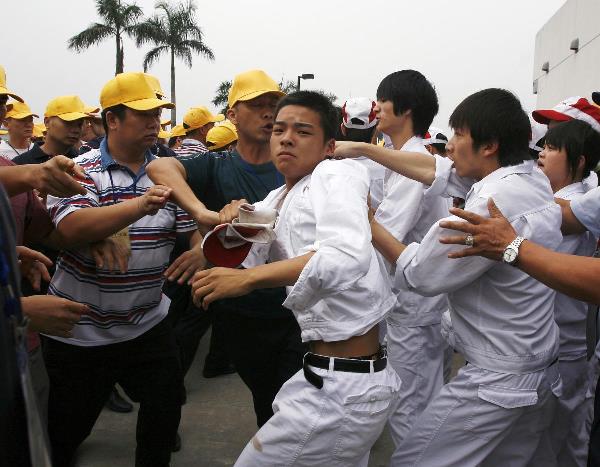
Strike-breaking role of ACFTU
We offer a challenge to the editors of redchina: Name a single strike in China in recent years that has been organised or even given support by the official unions? You will find this a very difficult mission. In criticising our call for independent unions you don’t say what your alterative is. This seems to be a tacit defence of the official unions, without addressing their strike-breaking anti-working class role. Is this your position?
The slogan of independent unions has not been invented by Trotskyists and Marxists, but has arisen from the workers themselves, from their own experience. In some of the struggles in 2018 such as the strikes by tower crane drivers, the workers have called for an independent union and this has actually been created, de facto, by these workers. This was also a key demand of the Honda Foshan workers in 2010 for example. It has been raised in many strikes over the past two decades in China. This is because the official unions are widely seen by the mass of workers as an additional barrier to their struggle. These so-called unions act like “a second police force” of the capitalists and the state as we pointed out in our article.
➵ China: Repression and arrests used to end Yue Yuen strike
The official unions are not organised democratically and are closely allied with management in both state and private companies. It is very common for the union head at a company to be a management appointee and stooge.
Redchina makes the claim (no concrete examples are offered) that independent unions have been used for “restoring capitalism in former socialist countries”. But this attempt to discredit the idea of independent unions as a bourgeois plot, which echoes the propaganda of the authorities who smeared the crane operators and other strikers this year as “manipulated by foreign forces”, does not stand up to examination.
Capitalist restoration
In the former Stalinist states, which were authoritarian and therefore not genuinely socialist, although based on public ownership, which we fight for, the main force behind the restoration of capitalism since the late 1980s, was not workers and newly formed unions. It was the former ‘Communist’ officials, factory directors and top military, who led the charge back to capitalism, turning themselves into a new super-rich bourgeoisie and “diving into the sea of business”. Workers were cheated and robbed in this process as the old planned economy was dismantled and transformed into the private wealth of former bureaucrats, while workers’ rights were undermined.
In some cases, new trade union formations failed to clearly oppose the process of capitalist restoration, or even embraced some of the toxic illusions in the ‘market’. But their role was a secondary one, with the main counter-revolutionary pressure coming from the former ‘Communist’ leaders and officialdom. Look at most of these former Stalinist countries today, from Russia to Kazakhstan to the Czech Republic and we see governments led by former members of the ‘Communist’ officialdom or their family members, who merely switched to become capitalists as easily as a drinker switching from red wine to white.
In Poland, where millions joined the independent union ‘Solidarity’ in the strike wave of 1980-81, this organisation today, much smaller and more bureaucratic, has become a stronghold of reactionary pro-capitalist ideas. But that was not the case in the beginning.
During the mass strikes of 1980-81 the workers in ‘Solidarity’ were moving towards the position of defending the gains of the planned economy, but wanting to remove the unaccountable and privileged bureaucrats to establish workers’ democratic control. From a working class standpoint this was a very progressive movement, but was lacking a clearly worked out programme and perspective for struggle.
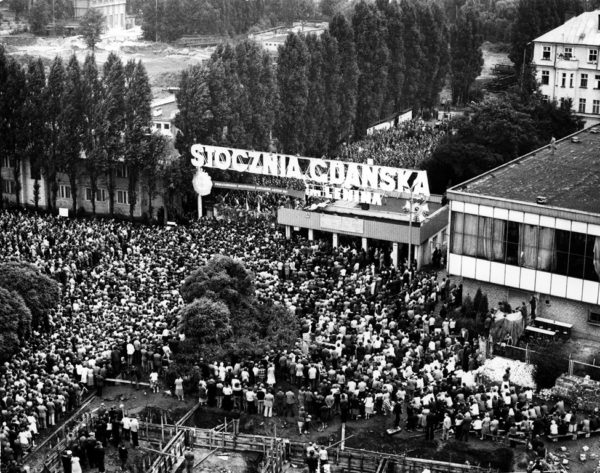
A layer of right-wing religious-influenced intellectuals attached themselves to the leadership of this movement, but could not shift the movement decisively onto capitalist lines at that stage. Their main contribution during the mass movement was to apply the brakes, always urging retreat and compromise.
These intellectuals were very similar in outlook to certain Chinese liberals and pan-democrats today. The right-wing evolution of this former mass workers’ movement occurred later, after the military crackdown (Martial Law) in Poland in December 1981, which drove the trade union underground and facilitated the right-wing to take control of ‘Solidarity’. By the end of the 1980s the union leaders and their former jailers the ‘Communist’ bureaucrats had united around the same position: capitalism.
Capitalism opposes independent unions in China
In China, the lack of a genuine i.e. independent trade union movement became a big advantage for multinational capitalism in its quest for increased profits. This is a major reason so many foreign capitalists chose to relocate production to China. In other words, China’s actual experience contradicts redchina’s claim that the re-emergence of capitalism is helped by the formation of independent unions.
In relation to China today, there is the US-funded Hong Kong NGO China Labour Bulletin (CLB), which we criticise in our article, China: Zhuhai Flex workers’ strike sabotaged by official trade union. This group does not advocate independent unions. More than ten years ago CLB changed its position and now advocates “reform” of the ACFTU saying independent unions are “unrealistic” in China.
CLB has received considerable financial support from US government-linked sources like the National Endowment for Democracy. So it is quite significant that a group that could reasonably be bracketed in the “pro-bourgeois” and “restoration of capitalism” category, opposes the demand for independent unions in China and instead supports reform within the ACFTU and CCP-state, a position which we have criticised as a fatal dream. We are sure your readers would like to know where redchina stands on this question. As you clearly also oppose the call for independent unions, what is your alternative? Is it also to support a “reformed” ACFTU? And if so, how do you distinguish your position from the “pro-bourgeois, restorationist” CLB?
Can union struggle achieve victories?
Finally, we must take issue also with the extremely simplistic, black-and-white argument: “Because in the neo-liberal era there is no room for social reforms under capitalism, the so-called independent trade unionism is no longer able to win any, even solely economic, benefits for the working class like it did during the post-World War II period.” [redchinacn.net commentary, 21 May 2018]
The epoch of imperialism and capitalist globalisation demands fighting trade unions to win improvements. In the West, the capitalists could afford concessions to the working class during the long boom 1950-75. Then followed the era of neo-liberalism with a ferocious capitalist offensive to redistribute wealth from the public to private sectors, and from the poor to the rich. At this time, the leaders of most trade unions globally openly accepted capitalism and even neo-liberal policies, a process that was mirrored in the collapse or political surrender of formerly “socialist” and “communist” parties. In China, this period saw massive growth of Chinese and foreign-owned capitalism, privatisation of state-owned companies, unprecedented exploitation of especially migrant workers and an explosion of informal precarious employment, all of which were made easier by the lack of workers’ rights and fighting unions.
But, both in the West and in China, to claim it is not possible for unions to win reforms through mass workers’ struggle is completely false and contradicted by reality.
Right now, US teachers in at least five states (West Virginia, Oklahoma, Arizona, North Carolina, Colorado) have won significant victories by engaging in very militant, historic strikes. They have won increased salaries and more money to the public education system. This is in the US, under Trump – it doesn’t get more neo-liberal than that!
These strikes, which have also emboldened other workers in the US to fight, have shown that determined workers’ struggle can get results. This is also shown by mass union protests in Argentina and France against neo-liberal pension reforms which aim to cheat workers and pensioners. This shows that some neo-liberal attacks can also be stopped by mass action.
On a smaller scale we also have a good example from Hong Kong, where a ten-day strike in January by public estate cleaners managed to stop the company from cheating them out of severance pay. These workers are members of an independent union, the HKCTU.
A socialist alternative
Of course, what the capitalists concede with the left hand, they will take back with the right hand, once the relationship of forces has shifted back in their favour. This is not specific to the “neo-liberal era” but has always been true under capitalism. This is why Marxists and genuine socialists stand not only for reforms (universal pension system, cheap and good public housing, living wage, free education, free healthcare) by organising mass struggle, but also for the overthrow of capitalism which is the only way to safeguard and make permanent these reforms.
The key issue, which is not addressed by simplistic black-and-white formulations about the impossibility of successful union struggle in the era of neo-liberalism, is the need for a fighting leadership and democratic union structures, which enable the grassroots members to eject or overturn a conservative or cowardly leadership and reorient their organisations towards struggle.
chinaworker.info stands for political trade unionism, for socialist policies also in the union field, and a mass political party to represent the working class. This cannot be imposed upon workers as an ultimatum, but by actively participating in and supporting their struggles, helping workers to build their own genuine unions in place of a state-controlled strike-breaking organisation. Marxists can in this way win the working class to socialist ideas and the need for organised mass struggle against capitalism.
